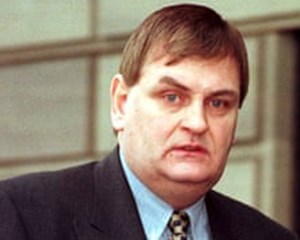Woods says Torbett exercised tremendous power over the boys. He could decide their future as players or rejects – a position he cynically exploited. "I was frightened to say anything to Torbett because the dream of playing for Celtic was still there, even though here I was all of a sudden in this nightmare. He could put the fear of God into you. I went home that evening and never said a word to anyone about it. When I went along to the next training session, Torbett acted as if nothing had happened at all."
伍茲說托貝特對男孩們行使著巨大的權力。他可以決定他們的未來:成為球員,或被淘汰。他正是利用了這一點。“我很害怕跟托貝特說些什么,因為我‘為凱爾特踢球’的夢想還在那里,即便是在那里墜入了噩夢。他會令你感到畏懼。那天晚上我回到家,對任何人都沒有說起過這件事。后來在我參加下一次訓練的時候,托貝特就好像什么事情都沒發生過一樣。”
Celtic Boys Club was at the time regarded as the elite youth football side in Scotland, and a potential entry into life as a full-time professional for thousands of young players. But for more than two decades it was also a magnet for paedophiles. At least six men connected with the Celtic Boys Club have come under investigation for sexually assaulting boys between the late 1960s and the early 90s. Three of them have been convicted and have served prison sentences.
“凱爾特男孩俱樂部”在當時是蘇格蘭公認的精英青年足球俱樂部,也是成千上萬名年輕球員進入全職職業生涯的一個潛在入口。但20多年來,那里也是戀童癖們的向往之地。20世紀60年代末到90年代初有6名以上與“凱爾特男孩俱樂部”有關的男子因性侵男孩而接受調查,其中三人已被定罪并服刑。

Now 21 of survivors are bringing a civil case against the club, which will be heard next year. The litigants include at least one prominent ex-Celtic player, and former professional players for other Scottish Premiership sides and Scotland's national team. They are seeking damages from the parent club, which they claim had "corporate responsibility" for child grooming, assaults and rape by men with longstanding connections to Celtic Park. The survivors and their families believe the leadership of the club knew about the abuse and did nothing about it. They also allege that Torbett was dismissed from the Boys Club in 1974 following accusations of abuse, but was allowed back into the club after four years, where he continued to work with young boys.
如今,有21名受害者對該俱樂部提起了民事訴訟,案件將于明年進行審理。訴訟當事人包括1名及以上著名的前凱爾特人球員以及其他蘇格蘭英超球隊和蘇格蘭國家隊的前職業球員。他們正向其母俱樂部尋求賠償,聲稱該俱樂部對兒童裝束、毆打和強奸行為負有“企業責任”,這些行為都是與“凱爾特人公園球場”有長期關系的男性所為。受害者和他們的家人認為俱樂部的領導層知曉虐待但卻無動于衷。他們還聲稱托貝特在1974年因被指控虐待而被男孩俱樂部開除,但四年后又被允許重新回到俱樂部并繼續和年輕男孩們一起工作。
Celtic's official response is that none of this abuse was linked in any way with the parent club, and that the Boys Club was a separate legal entity. Survivors say this denial has added to their trauma and claim this is typical of the club's attitude: had the parent club listened to the voices of survivors from early on, the abusers' reign would not have lasted so long.
凱爾特的官方回應是,這些虐待行為與其母俱樂部沒有任何聯系,男孩俱樂部是一個獨立的法律實體。然而,受害者認為這種否認是在他們的傷口上撒鹽,并聲稱這是俱樂部的托詞:如若其母俱樂部從一開始便愿意傾聽受害者的聲音,那么施虐者的統治應該早已瓦解。
As a teenager, Gordon Woods ran away from home and spent decades living and working as far from Scotland as he could. He never spoke of the abuse he suffered. Now 65, he has built a life for himself in a small village in rural Aberdeenshire. Recently he found out that, after a particularly bad incident, his parents had become concerned and tried to raise the alarm about Torbett's behaviour.
戈登·伍茲十幾歲時便離開家鄉,幾十年來一直在遠離蘇格蘭的地方生活和工作。在此期間他從未談及自己所遭受的虐待。現年65歲的他在阿伯丁郡的一個小村莊里開啟了自己新的生活。直到近期他才知道自己的父母在一次特別嚴重的事故后開始擔心并試圖對托貝特的行為發出警告。












